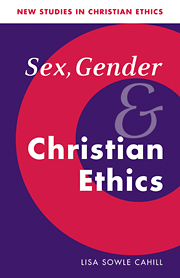Book contents
- Frontmatter
- Contents
- General editor's preface
- Acknowledgments
- 1 Sex, gender, and the problem of moral argument
- 2 Feminism and foundations
- 3 Particular experiences, shared goods
- 4 “The body” – in context
- An interlude and a proposal
- 5 Sex, gender, and early Christianity
- 6 Sex, marriage, and family in Christian tradition
- 7 The new birth technologies and public moral argument
- Concluding reflections
- Notes
- Index
- New Studies in Christian Ethics
5 - Sex, gender, and early Christianity
Published online by Cambridge University Press: 05 June 2012
- Frontmatter
- Contents
- General editor's preface
- Acknowledgments
- 1 Sex, gender, and the problem of moral argument
- 2 Feminism and foundations
- 3 Particular experiences, shared goods
- 4 “The body” – in context
- An interlude and a proposal
- 5 Sex, gender, and early Christianity
- 6 Sex, marriage, and family in Christian tradition
- 7 The new birth technologies and public moral argument
- Concluding reflections
- Notes
- Index
- New Studies in Christian Ethics
Summary
The object of this chapter is to show what bearing the faith and practice of early Christianity had on sex and gender. Its thesis is essentially that Jesus' preaching of the reign or kingdom of God represents a new experience of the divine presence in history, an experience which transforms human relationships by reordering relations of dominance and violence toward greater compassion, mercy, and peace, expressed in active solidarity with “the poor.” Christian ethics today should encourage forms of behavior which serve an analogous function, without necessarily replicating the precise practices the New Testament records. The approach adopted thus represents a departure from a more familiar one of applying texts to issues; or of showing why the standard texts are not relevant to the issues as posed in our own time.
The NT cannot be expected to specify a “sexual ethics” as such, for the same reason that it does not provide a comprehensive ethics in any sphere of human action. Ethics in the NT is not a topic of interest autonomous from the new relationship with God which Jesus initiates. The gospel is about the good news of God's reign, and an invitation to live within it, not about a timeless system of moral instruction. The gospel certainly requires that all relationships be reconfigured by life in the new community inspired by the Lord. Insofar as the NT literature represents the concrete meaning of the gospel in relation to the life situations of the early Christian communities, it provides illustrations which remain provocative and even paradigmatic today.
- Type
- Chapter
- Information
- Sex, Gender, and Christian Ethics , pp. 121 - 165Publisher: Cambridge University PressPrint publication year: 1996



